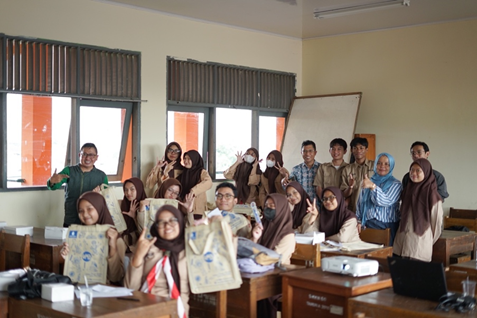Strengthening students’ ability to create content in tourism brand communication
DOI:
https://doi.org/10.22219/jcse.v4i3.27175Keywords:
Branding, Communication, Content creation, TourismAbstract
Vocational high school of 60 Duri Kepa Jakarta has an advantage in developing tourism learning. This is essential in realizing national development priorities, namely tourism. Students' abilities are supported by technological developments and various social media applications to communicate tourism branding in the city of Jakarta. A number of tourist destinations in Jakarta are popular and some are not popular, this issue has sparked student communication creativity in communicating the branding of tourist destinations. Community service programs in partnership with neighboring countries provide new enthusiasm in digital content literacy and environmental communication. Training on communicating tourism destination branding requires out of the box ideas, so that people or travelers can accept the meaning of branding communicated by students about the situation of the destinations they visit. This training results in changes in students' ability to communicate branding of tourist destinations in the city of Jakarta which is based on sustainable tourism communication.
Downloads
References
Aisyah, N., Meutia, R.F., & Sairah, S. (2023). Training: Digitalization-based human resource empowerment on social media and marketing 5.0 Namira Islamic School Medan. International Journal Engagement and empowerment, 3(1). https://doi.org/10.53067/ije2.v3i1.89.
Al-Ansi, A. S. (2023). The Semantics of the oath in the holy Qur’an, Surat al-Tin. Jurnal Arabik Literatur, 1(1), https://doi.org/10.58223/dzilmajaz.v1i1.41.
Baswaran, D. T. (2021). Virtual tour sebagai alternatif dan media promosi pariwisata. Warta Pariwisata ITB, 19 (1), https://doi.org/10.5614/wpar.2021.19.1.04.
Cheung, M. L., & Pires, G. D., Rosenberger, P.J., Leung, W.K.S., Sharipudin, M.S (2021). The role of consumer-consumer interaction and consumer-brand interaction in driving consumer-brand engagement and behavioral intentions. Journal of Retatiling and Consumer Services, Vol 61, https://doi.org/10.1016/j.jretconser.2021.102574.
Cesario, F., Sabino, A,. Moreira, A., Portugal, M., Correia, A. (2022). Students’ motivation for a sustainable career in the hospitality industry in Portugal. Suistainbiliti, 14(11), 6522, https://doi.org/10.3390/su14116522.
Daulay, L. K., & Boy, F., Nakaromi, N., Prakoso, P., Ramadhanty, U. (2022). Transformasi digital di ekowisata bukit Peramun. Jurnal Industri Pariwisata, 5(1). https://doi.org/10.36441/pariwisata.v5i1.991
García-Hernández, A., Muñoz-Repiso, A.G., Casillas-Martín, S., & Cabezas-González, M. (2022). Sustainability in Digital Education: A Systematic Review of Innovative Proposals. Education Sciences, 13(1), 33. https://doi.org/10.3390/educsci13010033.
Habimana, A., Saaverdra, R., Shining, V. (2023). The role of educational institutions in sustainable tourism development in Rwanda. Central Asean Innovation on Tourism Management and Finance, 4(3), 51-80. https://doi.org/10.17605/OSF.IO/VGZYM.
Hatipoglu, B. K., & Ertuna, B., Denizci, F.C. (2022). Sustainable tourism and community well-being: A situation analysis using participative action research. Springer International Publishing, 131-148. https://doi.org/10.1007/978-3-030-92208-5_9
Istiqomah, N & Rahmawati, A. (2020). School well-being siswa full day dan siswa regular school. Jurnal Psikologi Tabularasa, 15(1), 19-28 https://doi.org/10.26905/jpt.v16i1.4851
Lin, J. & Zhou, Z. (2022). The positioning of green brands in enhancing their image: the mediating roles of green brand innovativeness and green perceived value. International Journal of Emerging Market, 17(6)
Kah, S. (2023). Local solutions for national problems: How nonprofit organisations tackle the sustainable development goals. Social Innovation Journal, 19.
Kamil, S. U. (2017). City branding sebagai strategi komunikasi pariwisata Kabupaten Buton Tengah. Metacommunication: Journal of Communication Studies, 2(1), 1-13. http://dx.doi.org/10.20527/mc.v2i1.2995
Lund, N. F., & Scarles, C. (2019). The brand value continuum: Countering co-destruction of destination branding in social media through storytelling. Journal of TRavel Research, Vol 59(8), https://doi.org/10.1177/0047287519887234.
Makhasi, G. Y. M & Sari, S. D. L (2017). Strategi Branding Pariwisata Indonesia Untuk Pemasaran Mancanegara. ETTISAL Journal of Communication, 2(2), 31-41, https://doi.org/10.21111/ettisal.v2i2.1265Marta, R. (2018). Media komunikasi dalam branding pariwisata Kota Padang. Prosiding Konferensi Nasional Komunikasi.
Marta, R., & Havifi, I. (2018). Media Komunikasi dalam Branding Parawisata Kota Padang. Prosiding Konferensi Nasional Komunikasi, 1(01). http://dx.doi.org/10.25008/pknk.v1i1.89
Musnaini, Suherman, Wijoyo, H., & Indrawan, I. (2020). Digital Marketing (K. B. J. Jl. Gerilya No. 292 Purwokerto
Selatan & Tengah (Eds.)). CV. Pena Persada.
Nofrion. (2023). Who are our student? The implementation of the Kutsawa technique in learning reflection based on lesson study for learning community (ISLC). Retrieved from https://osf.io/scw36/: https://osf.io/scw36/
Pejabat Pengelola Informasi dan Dokumentasi. (2023). https://ppid.jakarta.go.id/detail/0/2023
Putritamara, J. A., Kusumastuti, A.E., Huda, A.N., & Ndaru, P.H. (2022). Brand behavior applied to indonesian millennial consumers in the leisure economics era a meta-analysis study. Proceeding of the 2nd International Conference on Social Science, Humanity and Public Health (ICOSHIP) Advances in Social Science, Education and Humanities Research. https://doi.org/10.2991/assehr.k.220207.057
Rimadias, S., Alvionita, N., Amelia, A.P. (2021). Using social media marketing to create brand awareness, brand image, and brand loyalty on tourism sector in indonesia. The Winner, 22(2), 173-182 https://doi.org/10.21512/tw.v22i2.7597
Scorrano, P., Fait, M., Maizza, A., Vrontis, D. (2019). Online branding strategy for wine tourism competitiveness. International Journal of Wine Business Research, 31(2), 130-150. https://doi.org/ 10.1108/IJWBR-06-2017-0043
Wijanarko, S., Nurlaela, L., Maspiyah & Rijanto, T. (2022). Teachers' perception of gender on gender-responsive learning in the vocational school of tourism. International Journal for Educational and Vocational Studies, 4(1), 11-18 https://doi.org/10.29103/ijevs.v4i1.5508 .
Wibisono, P. (2021). Quality tourism? Untuk pariwisata Indonesia. Warta Pariwisata ITB, 19(2), 14 https://doi.org/10.5614/wpar.2021.19.2.05.
Yaniasti, N. L., & Setiawan, G.N. (2021). “Cyber counseling” sebuah media konseling di era revolusi industri 4.0 bagi siswa SMK Pariwisata Triatmajaya Singaraja. Jurnal Bimbingan dan Konseling, 6(1), 47-57. http://dx.doi.org/10.31604/ristekdik.2021.v6i1.47-57
Yanpisit, K., & Surangkul, S. (2022). Phrae-wa studies and driving towards sustainable development goals by university for local development. Asean Journal of Tradisional and Innovation Art and Textile, 1(1), 55-72, Retrieved from https://so06.tci-thaijo.org/index.php/TIAT/article/view/254857
Yuan, X., Yu, L., Wu, H., Luo, J., & Li, Xi. (2021). Sustainable development goals (SDGs) priorities of senior high school students and global public: recommendations for implementing education for sustainable development (ESD). Educational Research Internasional, https://doi.org/10.1155/2022/2555168.
Yuristiadhi, G. (2017). Strategi Branding Pariwisata Indonesia Untuk Pemasaran Mancanegara. ETTIS
Hatipoglu, K.B., Ertuna, B., & Denizci, F. C. (2022). Sustainable tourism and community well-being: a situation analysis using participative action research. In planning and managing sustainability in tourism: empirical studies, best-practice cases and theoretical insights (pp. 131-148). Cham: Springer International Publishing.

Downloads
Published
How to Cite
Issue
Section
License
Copyright (c) 2023 Henni Gusfa, Riki Arswendi, S. Syaefuddin

This work is licensed under a Creative Commons Attribution-ShareAlike 4.0 International License.












